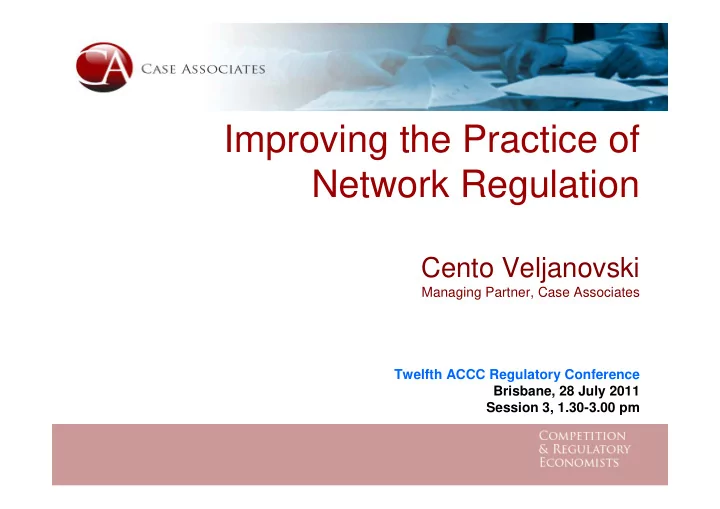

Improving the Practice of Network Regulation Cento Veljanovski Managing Partner, Case Associates Twelfth ACCC Regulatory Conference Brisbane, 28 July 2011 Session 3, 1.30-3.00 pm ����������������� ����������������������������������� www.casecon.com
Top three things economists can contribute Theory Incentives Evidence
Framework I Provide theory of network interactions, outcomes and effects which has evolved and is evolving as problems & issues emerge. Avoids stupid regulation But theories differ – move from monopoly to competition – natural monopoly/essential facility – contestability – one- & two-way networks & network effects – pricing - peak; Ramsey, ECPR, LRIAC, MC – entry assistance; cross-sub/averaging Group think and acceptability verses frontier analysi s
Framework II Provides hard definitions of objectives, tradeoffs, terms, concepts (cross subsidy; competition; predation; foreclosure) Better understanding of competitio n – – standard – service, access, facilities, intermodal competition/tradeoffs – oxymoron of competitive monopoly bottlenecks – winner takes all & network effects – Foreclosure Access principles, competition, entry, investment, innovation matched to liabilities and remedies
Incentive Analysis I ‘the bad economist confines himself to the visible effect; the good economist takes into account both the effect that can be seen and those effects the must be foreseen’ Economics is about incentives and the ‘must be foreseen’ effects on prices, access, QoS, investment ,etc. Unintended consequences and disincentive effects e.g. – Averch Johnson effect - ROR lead to overcapitalisation – Peltzman effect – bike helmets leads to more cycling fatalities – Waterbed effect: lower termination and interchange fees leads to higher prices.
Incentive Analysis II Need theory of adaptive responses & dynamic efficiency – complex New political or regulatory economics - regulation creates gainers and losers who do not react passively – they will invest to getting better terms, rent seeking, lobbying, acting strategically/gaming the system (to even outright fraud). Regulators will also Pushing new frontiers – transactions costs, game theory, behavioural economics, principal/agent; contract analysis; institutional economics but at loss of simplicity and clear guidance Need to incorporate insight into policy, rules, enforcement and remedies.
Empirical analysis Economics is above all else empirical Yet ratio of theory to evidence still unacceptably high. Need to understand what effects regulation and how regulation and regulators behave before we regulate more Economists toolkit can assist in empirical analysis of regulation
Empirical analysis II Impact studies of existing regulation Better understanding of commercial reality – economists still have excessive belief in market failure and not in transaction cost explanations (the fallacy of the bees) The new comparative institutional economics looks at impact of institutional factors on economic outcomes, and economic forces on institutions and regulation Empirical studies of regulators – what they actually do as opposed to what they say or think they are doing Freidlanger and Stigler – no or perverse effects?.
What must economists learn
Administrability Economics needs look both at primary activity and the economics of rules and remedies – may lead to very different conclusions about law Not everything needs to depend on a CBA or rule of reason. All have heard of Type I & II errors, regulatory costs and asymmetric information, risk and uncertainty. These concepts and others can be used to develop framework for the choice between ex ante v ex post regulation, rules v standards; different enforcement approaches (civil, criminal, etc) and remedies. (seminal paper by Ehrlich & Posner).
Comprehensibility Need efficient economic advice – this implies that there can be excessive, wrong, untested, and advocacy economic analysis Often policy advice/criticism based on pure theory, assumed problems, or distort commercial reality. Or ignore real problems (the German painter and the tree) Economic advice should be subject to cost-benefit test – if marginal benefits fall short of marginal costs, economist should shut up. However may be strong divergence between private and social net benefits eg AT&T huge and important funding which generated zero private gain
Code of Conduct • Explain underlying intuitions. • Ensure economic theories are grounded in the facts of the case. • Know and explain limits of your data. • Carry out sensitivity analysis. • Employ (and develop) simple rules. • Use plain, non-technical language. • Where possible, draw on the established economic theory, not the latest advances. • Make sure the economic case well aligned with the legal case. • Don’t use complex economics particularly as a smokescreen for weak arguments. Source: OFT submission to OECD Policy Roundtable, Presenting Complex Economic Theories to Judges , Paris, 2008.
Recommend
More recommend